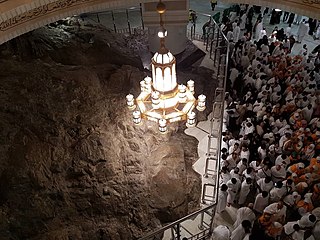
Sociology of religion is the study of the beliefs, practices and organizational forms of religion using the tools and methods of the discipline of sociology. This objective investigation may include the use both of quantitative methods and of qualitative approaches.

A social class is a grouping of people into a set of hierarchical social categories, the most common being the upper, middle and lower classes. Membership in a social class can for example be dependent on education, wealth, occupation, income, and belonging to a particular subculture or social network.

Rural sociology is a field of sociology traditionally associated with the study of social structure and conflict in rural areas. It is an active academic field in much of the world, originating in the United States in the 1910s with close ties to the national Department of Agriculture and land-grant university colleges of agriculture.
Medical anthropology studies "human health and disease, health care systems, and biocultural adaptation". It views humans from multidimensional and ecological perspectives. It is one of the most highly developed areas of anthropology and applied anthropology, and is a subfield of social and cultural anthropology that examines the ways in which culture and society are organized around or influenced by issues of health, health care and related issues.

Brigham Young University–Idaho is a private university in Rexburg, Idaho. Founded in 1888, the university is owned and operated by The Church of Jesus Christ of Latter-day Saints. It transitioned from a junior college to a baccalaureate institution in 2001 and was known for the greater part of its history as Ricks College.

Dorothy Edith Smith was a British-born Canadian ethnographer, feminist studies scholar, sociologist, and writer with research interests in a variety of disciplines, including women's studies, feminist theory, psychology, and educational studies, as well as in certain subfields of sociology, such as the sociology of knowledge, family studies, and methodology. Smith founded the sociological sub-disciplines of feminist standpoint theory and institutional ethnography.
Sociological imagination is a term used in the field of sociology to describe a framework for understanding social reality that places personal experiences within a broader social and historical context.

Sociology as a scholarly discipline emerged, primarily out of Enlightenment thought, as a positivist science of society shortly after the French Revolution. Its genesis owed to various key movements in the philosophy of science and the philosophy of knowledge, arising in reaction to such issues as modernity, capitalism, urbanization, rationalization, secularization, colonization and imperialism.
Herbert George Blumer was an American sociologist whose main scholarly interests were symbolic interactionism and methods of social research. Believing that individuals create social reality through collective and individual action, he was an avid interpreter and proponent of George Herbert Mead's social psychology, which he labelled symbolic interactionism. Blumer elaborated and developed this line of thought in a series of articles, many of which were brought together in the book Symbolic Interactionism. An ongoing theme throughout his work, he argued that the creation of social reality is a continuous process. Blumer was also a vociferous critic of positivistic methodological ideas in sociology.

A sociological theory is a supposition that intends to consider, analyze, and/or explain objects of social reality from a sociological perspective, drawing connections between individual concepts in order to organize and substantiate sociological knowledge. Hence, such knowledge is composed of complex theoretical frameworks and methodology.

The BYU College of Family, Home, and Social Sciences is a college located on the Provo, Utah campus of Brigham Young University and is housed in the Spencer W. Kimball Tower and Joseph F. Smith Building. The BYU College of Family Living was organized on June 28, 1951, while the BYU College of Social Sciences was organized in 1970. These two colleges merged to form the current college in 1981. The first dean of the college was Martin B. Hickman. The college includes nine major departments: Anthropology, Economics, Geography, History, Political Science, Psychology, The School of Family Life, Social Work, and Sociology. There are 21 different majors and 21 different minors that students can choose from, including 9 majors that have a correlating minor.

Sociology is a social science that focuses on society, human social behavior, patterns of social relationships, social interaction, and aspects of culture associated with everyday life. It uses various methods of empirical investigation and critical analysis to develop a body of knowledge about social order and social change. While some sociologists conduct research that may be applied directly to social policy and welfare, others focus primarily on refining the theoretical understanding of social processes and phenomenological method. Subject matter can range from micro-level analyses of society to macro-level analyses.
Jeffrey Charles Alexander is an American sociologist, and one of the world's leading social theorists. He is the founding figure in the school of cultural sociology he refers to as the "strong program".
Linda L. Haas is an American sociologist. She is professor emerita of sociology at the Indiana University-Purdue University Indianapolis.
The Religious Studies Center (RSC) is the research and publishing arm of Religious Education at Brigham Young University (BYU), sponsoring scholarship on Latter-day Saint (LDS) culture, history, scripture, and doctrine. The dean of Religious Education serves as the RSC's director, and an associate dean oversees the two branches of the RSC: research and publications.

Marxist sociology refers to the application of Marxist perspective within the study of sociology. Marxism itself can be recognized as both a political philosophy and a sociological method, insofar as it attempts to remain scientific, systematic, and objective rather than purely normative and prescriptive. Hence, marxist sociology is "a form of conflict theory associated with…marxism's objective of developing a positive (empirical) science of capitalist society as part of the mobilization of a revolutionary working class."
David A. Snow is a Distinguished Professor of Sociology at the University of California, Irvine.
Larry L. Howell is a professor and Associate Academic Vice President (AAVP) at Brigham Young University (BYU). His research focuses on compliant mechanisms, including origami-inspired mechanisms, microelectromechanical systems, medical devices, space mechanisms, and developable mechanisms. Howell has also conducted research in lamina emergent mechanisms and nanoinjection. He received a bachelor's degree in mechanical engineering from BYU and master's and Ph.D. degrees from Purdue University. His Ph.D. advisor was Ashok Midha, who is regarded as the "Father of Compliant Mechanisms."
George E. Cheney is an educator, writer, speaker, facilitator, and consultant. Together with his wife and colleague, Sally Planalp, he has a primary residence in Moab, Utah. Cheney is an internationally recognized leader in the area of organizational communication and focuses his work on the improvement of organizational processes with special attention to the triple bottom line and the pursuit of socially and environmentally responsible economic development. Cheney draws from a variety of disciplines and professions in his work, including sociology, economics, political science, philosophy, marketing, management, and applied ethics.

Grace Longwell Coyle (1892–1962) was a highly influential American thinker in the area of social work with groups. She wrote important books on the subject, and had great influence on the development of teaching group work concepts.









